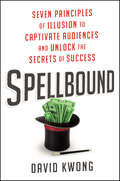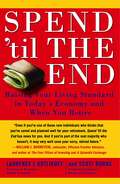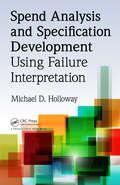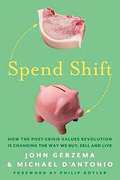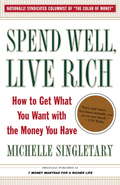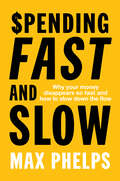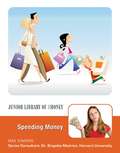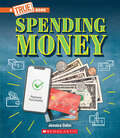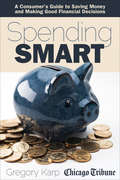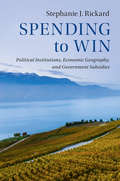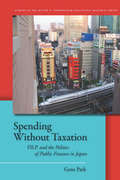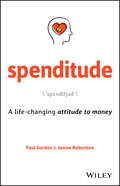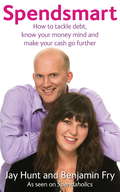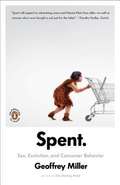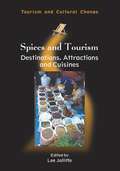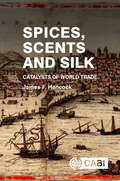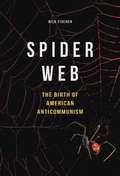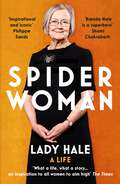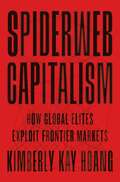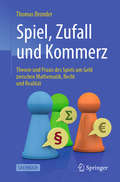- Table View
- List View
Spellbound: Seven Principles of Illusion to Captivate Audiences and Unlock the Secrets of Success
by David KwongA professional magician and illusionist—the head magic consultant for the hit film Now You See Me—reveals how to bridge the gap between perception and reality to increase your powers of persuasion and influence.David Kwong has astounded corporate CEOs, TED talk audiences, and thousands of other hyper-rational people, making them see, believe, and even remember what he wants them to. Illusion is an ancient art that centers on control: commanding a room, building anticipation, and appearing to work wonders. Illusion works because the human brain is wired to fill the gap between seeing and believing. Successful leaders—like Steve Jobs, Warren Buffett, and Ted Turner—are masters of control and command who understand how to sway opinions and achieve goals.In his years of research and practice, David has discovered seven fundamental principles of illusion. With these rules anyone can learn to:Mind the Gap—recognize and employ the perceptual space between your audience’s ability to see and their impulse to believe.Load Up—prepare to amaze your audience.Write the Script—discover the importance of shaping the narrative that surrounds your illusion.Control the Frame—explore the real life value of a magician’s best friend: misdirection.Design Free Choice—command your audience by giving them agency.Employ the Familiar—take secret advantage of habits, patterns, and audience expectations.Conjure an Out—develop backup plans that will keep you one, two, three, or more steps ahead of the competition.With Spellbound you’ll discover a different way to sell your idea, product, or skills, and make your best shot better than everyone else’s.
Spend 'Til the End: The Revolutionary Guide to Raising Your Living Standard--Today and When You Retire
by Laurence J. Kotlikoff Scott BurnsRich or poor, young or old, high school or college grad, this book, written by economist Laurence J. Kotlikoff and syndicated financial columnist Scott Burns, can change your life for the better! If you follow the advice in this book, it will raise your living standard (possibly by a lot), improve your lifestyle, and help you spend 'til the end. And it will completely transform your financial thinking, turning every bit of conventional financial wisdom on its head. If this sounds like a revolution in financial planning, you got it. So doThe New York Times,The Washington Post,The Wall Street Journal,USA Today,Time,Consumer Reports, and other top publications that have been featuring the authors' economics-based "consumption smoothing" approach to financial planning. Spend 'Til the Endsubstitutes economic wisdom for the "rules of dumb" that currently pass for financial advice. In the process it indicts the investment and financial-planning industry for giving most people saving and insurance targets that are much too high and then convincing them to invest in risky mutual funds and expensive insurance policies. The result is that most people are scrimping and saving during the years when they could be spending and enjoying their money -- and with no sure payoff. Easy to read, this book is packed with practical and often shocking advice on whether to work, how to pick a career, which job to take, where to live, what sort of house to buy, how much to save, when to retire, which kind of retirement account to use, whether to have kids, whether to divorce, when to take Social Security, how fast to spend down your assets in retirement, and how to invest.
Spend Analysis and Specification Development Using Failure Interpretation
by Michael D. HollowayConsidering that the biggest machines that do the most work are made up of smaller machines and components, it becomes obvious that when a large machine breaks, it is normally due to small components acting antagonistically. Detailing a time-tested method for increasing productivity and lowering operational costs, Spend Analysis and Specification Development Using Failure Interpretation explains how to establish performance-based procurement specifications for the components, devices, and items that contribute the most to operational downtime and repair/replacement costs. The book emphasizes the critical need to perform both spend and failure analysis in order to develop a procurement document, which will ultimately reduce overall costs. Accompanied by downloadable resources with helpful material such as, specification checklists, case study worksheets, form letters, and return on investment (ROI) worksheets that you can customize to your needs, the text discusses how to: Identify the products that will cost the most if they fail Develop performance-based procurement specifications to reduce direct and indirect costs Examine cost analysis as it relates to operations, maintenance, and production Determine effective criteria based on properties, test results, and standards for each operation Written by an industry expert with decades of experience giving seminars, training customers and associates, and authoring numerous papers and articles, the text provides the real-world understanding of the influential components and materials’ physical properties needed to engage in effective failure and spend analysis. It addresses product submission and monitoring and includes helpful tools so you can immediately get started on conducting your own cost-saving analysis.
Spend Shift
by D John Gerzema 8217 Michael AntonioGold Medal Winner, General Business, 2012 Axiom Business Book Awards Understanding the post-crisis consumer In Spend Shift, John Gerzema, world-renowned expert on consumer values, and Pulitzer prizewinning author Michael D'Antonio document the rise of a vibrant, values-driven post-recession economy. To tell the story of this movement, the authors travel to large cities and small towns across eight bellwether states, to examine the value shifts sweeping the nation. Through in-depth observation, proprietary data from Young & Rubicam, and interviews with experts, the authors analyze the changing consumer psyche, document the five shifting values and consumer behaviors that are remaking America and the world, and explain what it means to businesses and leaders. Explores a movement in society where the majority of American consumers are embracing both value and values Shows how post-crisis consumer expectations and behaviors will drive business decisions Draws on interviews with CEOs and entrepreneurs to reveal how companies like Ford and Etsy are reconnecting with the post-crisis consumer Compelling and insightful, Spend Shift is essential reading for anyone interested in how values are changing and how businesses can connect with consumers after the recession.
Spend Well, Live Rich (previously published as 7 Money Mantras for a Richer Life)
by Michelle SingletaryThe best financial planner Michelle Singletary ever knew was Big Mama, her grandmother. Big Mama raised Michelle and her four brothers and sisters on a salary that never reached more than $13,000 a year. Yet at her death, Big Mama owned her own home, had paid off a car loan, and had a beautiful collection of Sunday-go-to-meeting church hats and a savings account that supplemented her Social Security check and small pension. Most important, she had taught Michelle "7 Money Mantras for a Richer Life." Those mantras serve as the inspiration for this straight-talking book of practical personal financial advice that really works. The 7 Money Mantras are: 1. If it' s on your ass, it's not an asset! 2. Is this a need or is it a want? 3. Sweat the small stuff. 4. Cash is better than credit. 5. Keep it simple. 6. Priorities lead to prosperity. 7. Enough is enough. Michelle Singletary is a syndicated columnist for The Washington Post whose popular personal finance column appears in more than 120 newspapers. She's also a mother of three children who understands what it's like to live on a budget. In a plainspoken, sassy, no-nonsense voice, Michelle provides answers to the financial issues that confront almost every household: how to teach children the value of money; how to address money issues in a relationship or marriage; household saving tips; getting the best loans; and much more. "This book is about saving enough money to have choices," she writes. "It's about feeling free to be cheap if you can't afford to buy a ton of gifts at Christmas. It's about eliminating wasteful spend-ing so you can begin to save and invest. It's full of uncommon commonsense lessons and guidance on the way people should use their money." With humor and down-home financial wisdom, Michelle Singletary offers practical and realistic advice that will help you live well with the money you have. Michelle Singletary on . . . Romance and Money "It's okay to say: 'Honey, I love you and everything, but if you need money, ask your mama.'" Credit Cards "We are minimizing our financial potential by making minimum credit-card payments." Car Buying "If you want to save money, keep your car until you're on a first-name basis with the local tow-truck drivers." Leasing a Car "You, too, can drive a car you can't afford and then have to give it back. It's crazy." Gift Giving "Generosity isn't about how much you spend. It's about how much thought you put into the gift." Penny Pinching "I once bought a stick-shift car because it was $1,000 cheaper than the automatic in the same model. There was just one little problem. I couldn't drive a stick-shift. But at least I saved $1,000!"From the Trade Paperback edition.
Spend a Day in the Life of Your Customers
by Francis J. Gouillart Frederick D. SturdivantA senior executive's instinctive capacity to empathize with and gain insights from customers is the single most important skill he or she can use to direct a company's strategic posture. Yet most top managers at industrial companies consider customer contact the bailiwick of sales and marketing staff. And even if they do believe market focus is a priority, most retain only limited contact with consumers as their organizations grow, relying instead on subordinates' reports to define and sense the market for them. Such approaches are dangerous. First, most industrials define "customer" as the next entity in the distribution channel and requisition reports accordingly. But to get a true sense of the market, senior executives should consider the wants and needs of every step in the distribution chain. Another danger is that senior executives at industrial concerns often confuse information with knowledge. Managers faced with too much general market data tend to average results, blur boundaries, and miss distinct, segmented market opportunities. Finally, unless senior executives make market focus a strategic priority, they will not be motivated to initiate organizational change.
Spending Fast and Slow: Why your money disappears so fast and how to slow down the flow
by Max PhelpsIn today' s fast-paced world, we all know the feeling of being swept away in a whirlwind of consumerism, instant gratification and debt only to think, ‘ Where did all my money go this month?' In Spending, Fast and Slow, award-winning money coach Max Phelps helps readers understand the deep-rooted psychological factors that drive their spending habits and teaches them how to slow down spending to create a life of financial stability and true abundance.Married for 31 years, Max is self-confessed ‘ tight-arse' and his wife is a natural shopaholic. With polar-opposite money habits, money was a constant source of arguments for the first 11 years of their marriage. Many of his clients struggle with their partner' s money mindset in much the same way. Drawing inspiration from the groundbreaking works of behavioral economists and psychologists, such as Daniel Kahneman's Thinking, Fast and Slow, Max delves into the intricacies of human decision-making to uncover the cognitive biases and heuristics that often lead us astray when it comes to spending. Spending, Fast and Slow is an invitation to a life where money becomes a tool for achieving your dreams rather than a source of stress.
Spending Money
by Rae SimonsWhen you work for a paycheck or do chores around the house to get an allowance from your parents, you're exchanging the value of your time for money. Thinking of money as the time you spent working to earn it can help you understand the value of your time, your money, and the things you buy with it. Learn all this and more in Spending Money.
Spending Money: Budgets, Credit Cards, Scams... And Much More! (A True Book (Relaunch))
by Jessica CohnA series to build strong financial habits early on in life!Understanding how to make a budget, how credit cards work, and how to avoid scams are just three critical financial literacy skills that all kids should have. Did you know that the first credit card was introduced in 1950? Or that American consumers lost more than $5 billion to frauds in 2021? Learn all this and more in Spending Money - a book that gives kids the confidence and know-how they need to manage their finances.ABOUT THE SERIES: How can I make money? What is inflation? What is the difference between a debit card and a credit card? Economics - and more specifically, money - play such a large role in our lives. Yet there are many mysteries and misconceptions surrounding the basic concepts of finance and smart money management. This set of True Books offers students the know-how they'll need to start on the road to financial literacy - a crucial skill for today's world. Interesting information is presented in a fun, friendly way - and in the simplest terms possible - which will enable students to build strong financial habits early on in life.
Spending Smart: A Consumer's Guide to Saving Money and Making Good Financial Decisions
by Gregory Karp Chicago TribuneA collection of the Chicago Tribune&’s weekly &“Spending Smart&” articles from the award-winning business journalist and NerdWallet&’s credit cards expert. Spending Smart is a compact but immensely helpful collection of columns penned by Gregory Karp. Offering tips for consumers across a wide variety of fields, including insurance, banking, cars, phones, homes, travel, and more, this book is a terrific primer for how to take better care of your money and find deals where others aren&’t even looking. The simple and sober advice from Karp has made him a newspaper mainstay for many years, as evidenced by this book&’s vast amount of straightforward tips. In breaking down the true worth of a deal or exposing hidden value, Spending Smart is a reader&’s go-to financial adviser while on the go. Perfect to pull up on smartphones, e-readers, and tablets, Karp&’s friendly tone and measured counsel can be accessed just about anywhere readers have financial questions. Praise for Gregory Karp &“Greg Karp has a clear roadmap to wealth that is yours for the taking. Follow his simple steps and you will take control of your financial future. Get FIT now!&” —Clark Howard, The Clark Howard radio show &“Greg Karp gets it and you will too. His research and tips will help you keep more of the money you earn.&” —Steve & Annette Economides, New York Times bestselling authors of America&’s Cheapest Family Gets You Right on the Money &“The author provides solid advice and solid writing on a topic that benefits from a fresh voice.&” —Liz Pulliam Weston, MSN Money columnist and author of Your Credit Score
Spending to Win: Electoral Institutions, Economic Geography, And Subsidies (Political Economy Of Institutions And Decisions)
by Stephanie J. RickardGovernments in some democracies target economic policies, like industrial subsidies, to small groups at the expense of many. Why do some governments redistribute more narrowly than others? Their willingness to selectively target economic benefits, like subsidies to businesses, depends on the way politicians are elected and the geographic distribution of economic activities.<P><P>Based on interviews with government ministers and bureaucrats, as well as parliamentary records, industry publications, local media coverage, and new quantitative data, Spending to Win: Political Institutions, Economic Geography, and Government Subsidies demonstrates that government policy-making can be explained by the combination of electoral institutions and economic geography. Specifically, it shows how institutions interact with economic geography to influence countries' economic policies and international economic relations. Identical institutions have wide-ranging effects depending on the context in which they operate. No single institution is a panacea for issues, such as income inequality, international economic conflict, or minority representation.<P> Presents evidence from interviews with government ministers and bureaucrats.<P> Provides one of the first book-length studies of government subsidies<P> Explores how political institutions and economic geography interact to shape public policy.
Spending without Taxation: FILP and the Politics of Public Finance in Japan
by Gene ParkPark (political science, Baruch College) conducts an analysis of Japan's use of the Fiscal Investment Loan Program (FILP) in the postwar years. He argues that this financial mechanism enabled the ruling Liberal Democratic Party to maintain low taxes and a neoclassical fiscal policy based on low budget spending accompanied by pork barrel spending. This commitment to budget constraint enabled by FILP delivered economic benefits and was central to the postwar political bargain of budget restraint without sacrificing spending, he argues, but came at the cost of heavy intervention in finance, deferred fiscal burden, and the political challenge of reforming the program once the quality of its investments and loans deteriorated by the 1980s because the LDP had exploited the program too much in order to balance competing interests between fiscal hawks and pork-barrel politicians in order to maintain political power. Annotation ©2011 Book News, Inc. , Portland, OR (booknews. com)
Spenditude: A Life-changing Attitude to Money
by Paul Gordon Janine RobertsonHave you ever wondered why some people are naturally good with money? No matter your age or your income it is your spenditude – your attitude to money – that influences your financial success. Spenditude shows you how to tackle your habits and behaviours to uncover what drives your spending and allows you to gain financial security and live the life you want. This book is not about tedious budgets, get-rich-quick schemes, or giving up your daily coffee. Instead you will learn how to improve your relationship with money so you can release your financial anxiety and walk through life feeling in control. Financial wellbeing experts Paul Gordon and Janine Robertson reveal how with small and incremental steps you can empower yourself to change your spenditude for the better. Backed by extensive research, relatable case studies and in-depth interviews, this life-changing guide will help you get on the right path to financial security. It may seem an overwhelming task to change your thinking about money, but developing sound financial habits is within reach. Behaviour is the key that unlocks better financial outcomes. This motivating and practical guide will enable you to identify the habits you need to change, establish your financial goals and learn how to develop and follow a plan best-suited for your situation. Clear, straightforward chapters relate days of the week to the decades of your life – Monday to Friday is your working life and the weekend is your retirement – to drive home the fact that life is short so don't waste time. In a world where change is constant, FOMO is prevalent, and social media’s influence is unmistakable, there has never been a better time to take stock of your spenditude and put your financial future squarely in your own hands. Spenditude will change your attitudes to money so you can benefit from the coming changes and enjoy the rest of your life.
Spendsmart: Tackle debt and make your cash go further
by Benjamin Fry Jay HuntDo you dread opening bills and statements? Do you feel like your debts are spiralling out of control? Do you wish you had more money left at the end of the month?'Spendsmart' authors and money experts Benjamin Fry and Jay Hunt take a unique and holistic approach to helping you deal with all your financial worries. Firstly, Benjamin examines the real reasons behind your overspending, so that you can understand how to change, and then Jay provides you with practical and realistic solutions for spending less.By following their proven 5-step plan, you will be able to identify your debts, learn how to live on a budget without depriving yourself and apply their strategies to the way you continue to spend money in the future. Packed with budgeting suggestions, helpful questionnaires, realistic tips, and fun ideas, 'Spendsmart' is a must-read for anyone who wants to make their money go further.
Spendsmart: Tackle debt and make your cash go further
by Benjamin Fry Jay HuntDo you dread opening bills and statements? Do you feel like your debts are spiralling out of control? Do you wish you had more money left at the end of the month?'Spendsmart' authors and money experts Benjamin Fry and Jay Hunt take a unique and holistic approach to helping you deal with all your financial worries. Firstly, Benjamin examines the real reasons behind your overspending, so that you can understand how to change, and then Jay provides you with practical and realistic solutions for spending less.By following their proven 5-step plan, you will be able to identify your debts, learn how to live on a budget without depriving yourself and apply their strategies to the way you continue to spend money in the future. Packed with budgeting suggestions, helpful questionnaires, realistic tips, and fun ideas, 'Spendsmart' is a must-read for anyone who wants to make their money go further.
Spent: Sex, Evolution, and Consumer Behavior
by Geoffrey MillerA leading evolutionary psychologist probes the unconscious instincts behind American consumer culture Illuminating the hidden reasons for why we buy what we do, Spent applies evolutionary psychology to the sensual wonderland of marketing and perceived status that is American consumer culture. Geoffrey Miller starts with the theory that we purchase things to advertise ourselves to others, and then examines other factors that dictate what we spend money on. With humor and insight, Miller analyzes an array of product choices and deciphers what our decisions say about ourselves, giving us access to a new way of understanding-and improving-our behaviors to become happier consumers. .
Spices and Tourism
by Lee JolliffeThis is the first book to explore the relationship between tourism and spices. It examines the various layers of connection between spices and tourism in terms of destinations, attractions and cuisines. The book reveals how spice-producing destinations are employing spices in destination branding and encouraging spice farms to move towards tourism, while destinations not producing spices are employing spices and herbs in distinctive local cuisines. Both tangible and intangible spice heritages are highlighted as tools for developing destinations, creating attractions, inventing new forms of livelihoods and distinguishing local, regional and national cuisines. This volume will be useful for researchers and students in cultural tourism, culinary tourism, anthropology of food and food history.
Spices, Scents and Silk: Catalysts of World Trade
by James HancockSpices, scents and silks were at the centre of world trade for millennia. Exotic luxuries such as cinnamon, ginger, pepper, saffron, clove, frankincense and myrrh. Through their international trade, humans were pushed to explore and then travel to the far corners of the earth. Almost from their inception, the earliest great civilizations - Egypt, Sumer and Harappa - became addicted to the luxury products of far-off lands and established long-reaching trade networks. Over time, great powers fought mightily for the kingdoms where silk, spices and scents were produced. The New World was accidentally discovered by Columbus in his quest for spices. What made trade in these products so remarkable was that the plants producing them grew in very restricted areas of the world, distant from the wealthy civilizations of northern Africa, Greece and Europe. These luxuries could be carried from mysterious locations on the backs of camels or in the holds of ships for months on end, and arrived at their final destination in nearly perfect condition. Once the western world discovered the intoxicating properties of these products, their procurement became a dominant force in the world economy. Nothing else compared with their possible profit returns. In this book, eminent horticulturist and author James Hancock examines the origins and early domestication and culture of spices, scents and silks and the central role they played in the lives of the ancients. The book also traces the development of the great international trade networks and explores how struggles for trade dominance and demand for such luxuries shaped the world. Recommended for academics, students and general readers with an interest in crop and agricultural development, world trade, economic botany, history of food, and global economics and public policy, Spices, Scents and Silk offers a fascinating and insightful history.
Spider Web: The Birth of American Anticommunism
by Nick FischerThe McCarthy-era witch hunts marked the culmination of an anticommunist crusade launched after the First World War. With Bolshevism triumphant in Russia and public discontent shaking the United States, conservatives at every level of government and business created a network dedicated to sweeping away the "spider web" of radicalism they saw threatening the nation. In this groundbreaking study, Nick Fischer shines a light on right-wing activities during the interwar period. Conservatives, eager to dispel communism's appeal to the working class, railed against a supposed Soviet-directed conspiracy composed of socialists, trade unions, peace and civil liberties groups, feminists, liberals, aliens, and Jews. Their rhetoric and power made for devastating weapons in their systematic war for control of the country against progressive causes. But, as Fischer shows, the term spider web far more accurately described the anticommunist movement than it did the makeup and operations of international communism. Fischer details how anticommunist myths and propaganda influenced mainstream politics in America, and how its ongoing efforts paved the way for the McCarthyite Fifties--and augured the conservative backlash that would one day transform American politics.
Spider Woman: A Life – by the former President of the Supreme Court
by Lady HaleLady Hale is an inspirational figure admired for her historic achievements and for the causes she has championed. Spider Woman is her story. As 'a little girl from a little school in a little village in North Yorkshire', she only went into the law because her headteacher told her she wasn't clever enough to study history. She became the most senior judge in the country but it was an unconventional path to the top. How does a self-professed 'girly swot' get ahead in a profession dominated by men? Was it a surprise that the perspectives of women and other disadvantaged groups had been overlooked, or that children's interests were marginalised? A lifelong smasher of glass-ceilings, who took as her motto 'women are equal to everything', her landmark rulings in areas including domestic violence, divorce, mental health and equality were her attempt to correct that. As President of the Supreme Court, Lady Hale won global attention in finding the 2019 prorogation of Parliament to be unlawful. Yet that dramatic moment was merely the pinnacle of a career throughout which she was hailed as a pioneering reformer. Wise, warm and inspiring, Spider Woman shows how the law shapes our world and supports us in crisis. It is the story of how Lady Hale found that she could overcome the odds, which shows that anyone from similar beginnings will find that they can cope too.
Spiderweb Capitalism: How Global Elites Exploit Frontier Markets
by Kimberly Kay HoangA behind-the-scenes look at how the rich and powerful use offshore shell corporations to conceal their wealth and make themselves richerIn 2015, the anonymous leak of the Panama Papers brought to light millions of financial and legal documents exposing how the superrich hide their money using complex webs of offshore vehicles. Spiderweb Capitalism takes you inside this shadow economy, uncovering the mechanics behind the invisible, mundane networks of lawyers, accountants, company secretaries, and fixers who facilitate the illicit movement of wealth across borders and around the globe.Kimberly Kay Hoang traveled more than 350,000 miles and conducted hundreds of in-depth interviews with private wealth managers, fund managers, entrepreneurs, C-suite executives, bankers, auditors, and other financial professionals. She traces the flow of capital from offshore funds in places like the Cayman Islands, Samoa, and Panama to special-purpose vehicles and holding companies in Singapore and Hong Kong, and how it finds its way into risky markets onshore in Vietnam and Myanmar. Hoang reveals the strategies behind spiderweb capitalism and examines the moral dilemmas of making money in legal, financial, and political gray zones.Dazzlingly written, Spiderweb Capitalism sheds critical light on how global elites capitalize on risky frontier markets, and deepens our understanding of the paradoxical ways in which global economic growth is sustained through states where the line separating the legal from the corrupt is not always clear.
Spiel, Zufall und Kommerz: Theorie und Praxis des Spiels um Geld zwischen Mathematik, Recht und Realität
by Thomas BronderDas Spiel mit dem Glück Von Brett- und Kartenspielen über Glücksspielautomaten bis hin zu Lotterien und Wettbüros – dieses Buch ist ebenso breit angelegt wie die Welt des Spiels und zeigt, was all diesen Spielen gemeinsam ist und wie sie wirklich funktionieren. Dabei geht um den Vergleich diverser Spielsysteme anhand wertneutraler Merkmale insbesondere zum Unterschied von Glücks- und Geschicklichkeitsspielen. Wo regieren der Zufall und der Kommerz, wo die Geschicklichkeit? Wie greifen sie ineinander, und welchen rechtlichen Regelungen unterliegt das kommerzielle Spiel? Was macht den besonderen Reiz der Pokerspiele aus? Viele Beispiele zeichnen historische Entwicklungen nach, Zusammenhänge und Gesetze der Wahrscheinlichkeitstheorie werden anschaulich erklärt und lange Spielfolgen bis zum „Point of no return“ bildlich dargestellt. Thomas Bronder räumt außerdem mit vielen Irrtümern, ungenauen Begriffsvorstellungen und Missverständnissen auf, etwa zu Chancengleichheit, Verlusttempo und Auszahlquoten. Vom erfolgreichen Buchmachen über erfolglose Gewinnsysteme bis zu Schneeballsystemen, Falschspiel, Betrug und Manipulation wird kein Thema ausgelassen. So liegt hiermit nun eine kleine „Bibel“ des Spiels um Geld vor, die nicht nur für Spieler, Journalisten und Juristen interessant ist.Die zweite Auflage enthält viele Ergänzungen und Korrekturen mit einem umfangreichen Sachwortverzeichnis zum Nachschlagen. Sie teilt Nullsummenspiele in fünf Klassen ein, beschreibt Besonderheiten beim Pokern und geht auf die Probleme mit Online-Glücksspielen im Internet ein.
Spielanalyse im Sportspiel
by Daniel MemmertProfessionelle Spielanalysen – sei es im Training zur Gegnervorbereitung, im Wettkampf oder zur Nachbereitung – sind in Mannschafts- und Rückschlagsportarten heute auf unterschiedlichen Expertise-Ebenen unverzichtbar. Durch den Einsatz in den vier großen Anwendungsfeldern Vereine und Verbände, Wirtschaft, Wissenschaft sowie Medien ist ein völlig neuer Markt entstanden, der innerhalb der universitären Forschungs- und Lehraktivitäten zunehmend an Bedeutung gewinnt. In diesem prägnanten Lehrbuch stellen über 30 Autoren die historischen, wissenschaftlichen, praktischen und kommunikativen Aspekte von Spielanalysedaten vor. Zudem werden die vielfältigen Anwendungsmöglichkeiten von Videodaten in den Sportarten American Football, Beach-Volleyball, Cricket, Eishockey, Handball, Hockey, Rugby, Squash, Tennis, Tischtennis und Volleyball praxisnah erläutert. Studierende mit Bezug zur Sportwissenschaft erhalten einen umfassenden Einblick in die Spielanalytik auf der Basis von Video-, Event- und Positionsdaten und unterstützt durch ein didaktisch ausgefeiltes Konzept, das eine einfache Vermittlung der Lerninhalte ermöglicht. Zahlreiche digitale Lernkarten untermauern den Lerneffekt und gewährleisten eine optimale Prüfungsvorbereitung. Für Fortgeschrittene bietet die vertiefende Diskussion von Leistungsparametern in Bezug auf Geschlecht, Scouting oder Gegenpressing einen zusätzlichen Mehrwert.
Spielarten des politischen Konsums: Vom Boykott zum Buykotting
by Carolin V. ZorellDieses Buch bietet eine Analyse der Politik des Konsums und zeigt, wie der "gebildete Verbraucher" eine entscheidende Rolle bei der Förderung verantwortungsvoller Marktpraktiken und des Konsums spielt. Auf der Grundlage einer umfassenden interdisziplinären Perspektive untersucht es das Ausmaß, die Triebkräfte und die Verbindungen von Boykott, Kaufboykott, Kennzeichnungssystemen und sozialer Verantwortung von Unternehmen (CSR) in 20 europäischen Ländern. Eine zentrale Frage ist, ob makro-gesellschaftliche Orientierungsmuster hinsichtlich der Rolle des Staates, der Unternehmen und der Bürger individuelle und länderübergreifende Unterschiede beim Boykottieren und beim Kaufverbot erklären können. Wie das Buch zeigt, gibt es nicht nur einen Typus des "politischen Verbrauchers", sondern mehrere, und ihr Auftreten steht in direktem Zusammenhang mit nationalen Variationen von Kennzeichnungssystemen und der sozialen Verantwortung von Unternehmen. Die Verbraucher brauchen Anhaltspunkte und Informationen über die politischen Hintergründe ihrer Einkäufe, und die politischen Entscheidungsträger müssen diesem Bedarf durch politische Maßnahmen Rechnung tragen, die den nationalen Mustern in den Ansichten über Zusammenarbeit und Marktbeziehungen entsprechen.
Spielend Ziele setzen und erreichen: Objectives and Key Results mit LEGO® SERIOUS PLAY® (essentials)
by Reinhard Ematinger Sandra SchulzeReinhard Ematinger und Sandra Schulze unterstützen Sie mit diesem essential beim Formulieren von Zielen und Vereinbaren von Ergebnissen, indem sie ein Vorgehen erläutern, das Objectives und Key Results endlich greifbar macht. Die intelligente Verbindung mit LEGO® SERIOUS PLAY® sorgt dafür, die wichtigen Themen auf den Tisch zu bringen. Aktuelle Fallbeispiele begleiten Sie durch dieses essential, und konkrete Hinweise in den „Was Sie davon mitnehmen“-Abschnitten unterstützen Sie beim Transfer in die Realität Ihrer Organisation.
